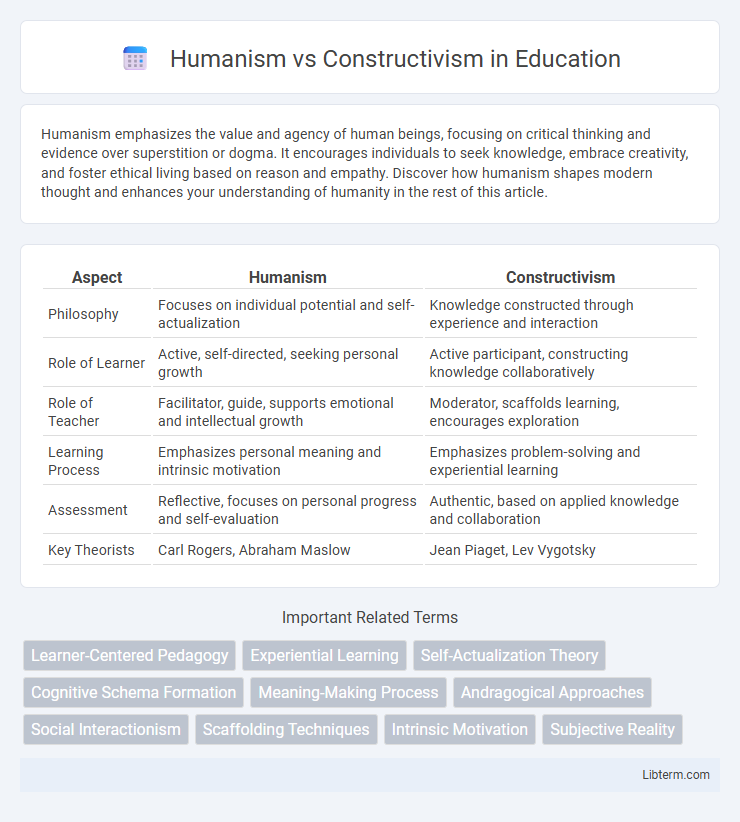Humanism emphasizes the value and agency of human beings, focusing on critical thinking and evidence over superstition or dogma. It encourages individuals to seek knowledge, embrace creativity, and foster ethical living based on reason and empathy. Discover how humanism shapes modern thought and enhances your understanding of humanity in the rest of this article.
Table of Comparison
| Aspect | Humanism | Constructivism |
|---|---|---|
| Philosophy | Focuses on individual potential and self-actualization | Knowledge constructed through experience and interaction |
| Role of Learner | Active, self-directed, seeking personal growth | Active participant, constructing knowledge collaboratively |
| Role of Teacher | Facilitator, guide, supports emotional and intellectual growth | Moderator, scaffolds learning, encourages exploration |
| Learning Process | Emphasizes personal meaning and intrinsic motivation | Emphasizes problem-solving and experiential learning |
| Assessment | Reflective, focuses on personal progress and self-evaluation | Authentic, based on applied knowledge and collaboration |
| Key Theorists | Carl Rogers, Abraham Maslow | Jean Piaget, Lev Vygotsky |
Introduction to Humanism and Constructivism
Humanism emphasizes individual potential and personal growth, advocating for education tailored to the learner's needs, emotions, and self-concept. Constructivism asserts that learners actively construct knowledge through experiences and social interactions, highlighting the importance of context and collaboration in the learning process. Both educational philosophies prioritize learner-centered approaches but differ in their focus on intrinsic motivation versus experiential knowledge construction.
Defining Humanism in Education
Humanism in education centers on the holistic development of learners, emphasizing personal growth, self-actualization, and intrinsic motivation. It prioritizes emotional well-being, creativity, and the cultivation of a supportive, student-centered learning environment. Unlike constructivism, which focuses on knowledge construction through interaction with the environment, humanism highlights individual experience and self-directed learning as key components of education.
Constructivism: Core Principles and Approaches
Constructivism emphasizes active learning through experience, where learners construct knowledge by interacting with their environment and reflecting on these experiences. Key approaches include collaborative learning, problem-solving, and inquiry-based activities that promote critical thinking and deeper understanding. The core principles stress that knowledge is subjective, context-dependent, and built upon prior understanding, facilitating personalized and meaningful learning processes.
Key Differences Between Humanism and Constructivism
Humanism emphasizes individual potential, self-actualization, and the importance of personal growth through intrinsic motivation, focusing on the whole person and their subjective experiences. Constructivism centers on knowledge construction through social interaction and active engagement with the environment, highlighting the role of prior knowledge and context in learning. Key differences include humanism's focus on emotional and psychological development versus constructivism's emphasis on cognitive processes and collaborative learning.
Learning Theories: Historical Context
Humanism emerged in the mid-20th century as a response to behaviorism and psychoanalysis, emphasizing personal growth and self-actualization in education. Constructivism, rooted in Piaget's cognitive development theory and Vygotsky's social interaction ideas, gained prominence in the late 20th century by advocating active learning through experience and social collaboration. Both theories shaped modern educational practices by highlighting learner-centered approaches, yet Humanism focuses on intrinsic motivation while Constructivism prioritizes knowledge construction through interaction.
Humanism: Impact on Student Motivation and Self-Actualization
Humanism in education emphasizes personal growth, self-motivation, and the development of individual potential, leading to increased student engagement and intrinsic motivation. By fostering a supportive and empathetic learning environment, humanistic approaches enable students to achieve self-actualization and develop a strong sense of autonomy. This contrasts with constructivism, which focuses more on knowledge construction through social interaction and experiential learning, whereas humanism prioritizes emotional wellbeing and personal meaning in the learning process.
Constructivism: Emphasizing Active Learning and Knowledge Construction
Constructivism centers on the idea that learners actively construct knowledge through experience and reflection, promoting deep understanding rather than passive absorption. This educational approach encourages collaborative learning environments where students engage in problem-solving and critical thinking to build personalized comprehension. By prioritizing active participation, constructivism fosters cognitive development tailored to individual perspectives and real-world contexts.
Practical Applications in the Classroom
Humanism in the classroom emphasizes student-centered learning, fostering self-motivation, and promoting emotional development through personalized activities and open communication. Constructivism applies hands-on experiences and collaborative problem-solving to encourage students to actively build knowledge based on prior understanding. Both approaches support differentiated instruction and critical thinking, enhancing student engagement and deeper comprehension.
Strengths and Limitations of Each Approach
Humanism emphasizes personal growth, self-actualization, and intrinsic motivation, fostering a learner-centered environment that enhances emotional and psychological development but may lack structure and measurable outcomes. Constructivism promotes active knowledge construction through experience and collaboration, encouraging critical thinking and problem-solving, yet it can be time-consuming and challenging to implement uniformly across diverse educational settings. Both approaches offer valuable insights into learning but require balance to address their inherent limitations in practical application.
Choosing the Right Educational Philosophy
Choosing the right educational philosophy involves weighing Humanism's emphasis on personal growth, self-actualization, and intrinsic motivation against Constructivism's focus on active learning through experience and knowledge construction. Humanism prioritizes individual needs and emotional development, fostering a supportive, student-centered environment, while Constructivism encourages collaborative learning and critical thinking by engaging students in problem-solving and discovery. Educators should consider the goals of their curriculum and the specific needs of their learners to determine whether a humanistic approach or a constructivist methodology better facilitates meaningful and lasting education.
Humanism Infographic

 libterm.com
libterm.com